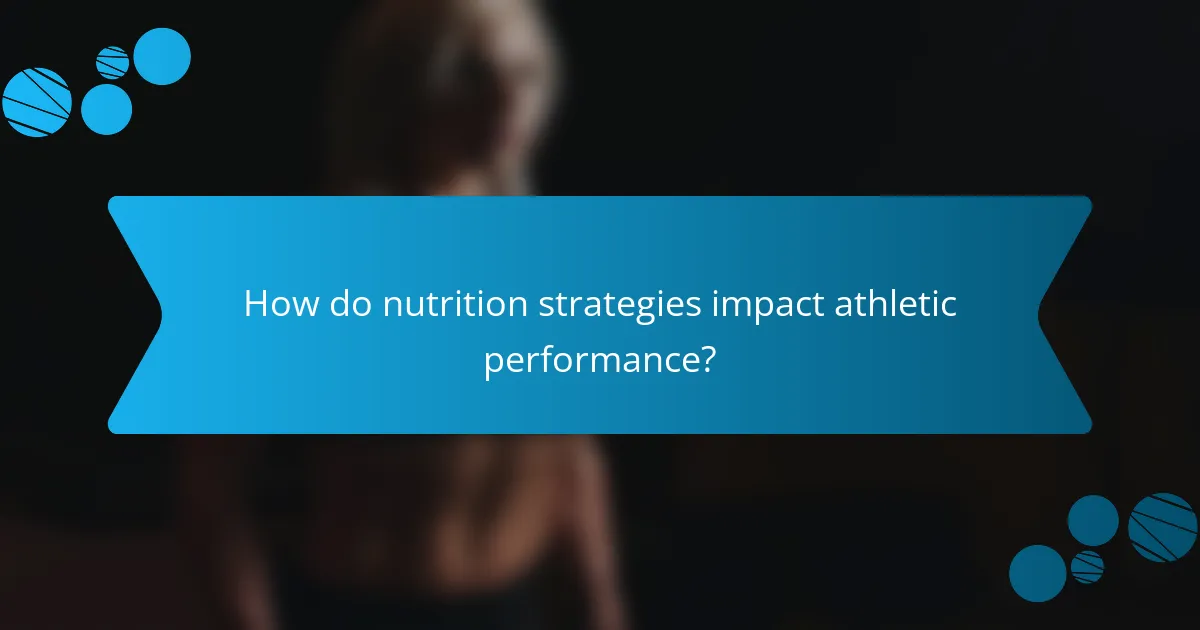Nutrition strategies are essential for athletes aiming to enhance performance and recovery. This article covers the impact of tailored nutrition plans, key dietary guidelines, sport-specific approaches, common challenges faced by athletes, and emerging trends in sports nutrition. Proper nutrient intake, hydration, and meal timing play crucial roles in optimizing energy levels and overall health.

How do nutrition strategies impact athletic performance?
Nutrition strategies significantly enhance athletic performance by optimizing energy levels, recovery, and overall health. Proper nutrient intake supports muscle repair, endurance, and reduces injury risk. For example, carbohydrates provide quick energy, while protein aids in muscle recovery. Hydration is also crucial, as even mild dehydration can impair performance. Athletes should focus on balanced meals rich in whole foods, vitamins, and minerals to sustain peak performance. Implementing tailored nutrition plans can lead to measurable improvements in strength, speed, and endurance.
What are the physiological effects of nutrition on athletes?
Nutrition significantly impacts athletes’ physiological performance by optimizing energy levels, enhancing recovery, and improving overall health. Proper nutrition strategies can lead to better endurance, strength, and agility. For example, carbohydrates fuel high-intensity workouts, while proteins support muscle repair. Hydration plays a critical role in maintaining performance and preventing fatigue. A balanced diet rich in vitamins and minerals further supports immune function, reducing the risk of injury. Tailoring nutrition plans to individual needs can maximize performance outcomes.
How does macronutrient balance influence energy levels?
Macronutrient balance significantly influences energy levels by providing the necessary fuel for physical and mental activities. A well-rounded intake of carbohydrates, proteins, and fats ensures optimal energy production.
Carbohydrates are the primary energy source, fueling high-intensity activities. They should comprise 45-65% of total daily calories for athletes. Proteins support muscle repair and growth, contributing 10-35% of total intake. Fats, while often overlooked, are crucial for sustained energy, especially during prolonged exercise, making up 20-35% of daily calories.
Research shows that inadequate macronutrient balance can lead to fatigue, impaired performance, and decreased recovery rates. Athletes must tailor their macronutrient ratios based on training intensity, duration, and individual metabolic responses to maintain energy levels effectively.
Which vitamins and minerals are crucial for optimal performance?
Vitamins and minerals crucial for optimal performance include vitamin D, calcium, magnesium, iron, and B vitamins. These nutrients support energy production, muscle function, and recovery.
Vitamin D enhances calcium absorption, vital for bone health. Calcium is essential for muscle contraction. Magnesium aids in energy metabolism and reduces fatigue. Iron is important for oxygen transport in the blood. B vitamins play a key role in energy release from food.
Athletes should ensure adequate intake of these nutrients through a balanced diet or supplements, as deficiencies can impair performance and recovery.

What guidelines should athletes follow for effective nutrition?
Athletes should follow guidelines that prioritize balanced macronutrients, hydration, and timing of meals. Focus on whole foods, including lean proteins, complex carbohydrates, and healthy fats.
1. Prioritize carbohydrates for energy, aiming for 6-10 grams per kilogram of body weight daily.
2. Include protein sources, targeting 1.2-2.0 grams per kilogram of body weight to support muscle recovery.
3. Stay hydrated, consuming at least 2-3 litres of water daily, adjusting based on activity levels.
4. Timing is crucial; consume meals and snacks within 30 minutes post-exercise for optimal recovery.
These strategies enhance performance and support overall health for athletes.
How can athletes create a personalized nutrition plan?
Athletes can create a personalized nutrition plan by assessing their individual needs and goals. First, they should evaluate their energy requirements based on training intensity and duration. Next, they can determine macronutrient ratios that support performance, focusing on carbohydrates for energy, proteins for muscle repair, and fats for overall health.
Hydration is also crucial; athletes should calculate fluid intake based on sweat loss during workouts. Additionally, incorporating nutrient-dense foods that align with personal preferences and dietary restrictions enhances adherence to the plan. Regularly monitoring progress and adjusting the nutrition strategy is essential for optimal performance.
What role does hydration play in athletic performance?
Hydration significantly enhances athletic performance by preventing fatigue and improving endurance. Adequate fluid intake maintains optimal physiological functions, regulates body temperature, and supports nutrient transport. Dehydration can lead to decreased strength, coordination, and cognitive function. Athletes should aim for tailored hydration strategies based on activity duration, intensity, and environmental conditions. For example, consuming 500 to 700 mL of fluid two to three hours before exercise is recommended.
How should meal timing be optimized for training and competition?
Meal timing should align with training and competition schedules to optimize performance. Consuming carbohydrates and protein before and after workouts enhances energy levels and recovery.
Pre-training meals should be rich in carbohydrates and low in fat and fibre to prevent gastrointestinal discomfort. Aim for a meal 3-4 hours before training. For immediate energy, a small snack 30-60 minutes prior can be beneficial.
Post-training, consume a combination of carbohydrates and protein within 30 minutes to replenish glycogen stores and support muscle repair. This timing enhances recovery and prepares athletes for subsequent sessions.
Hydration is crucial; drink water before, during, and after training. Tailoring meal timing to individual needs can significantly impact performance and recovery outcomes.

Which specific nutrition strategies enhance performance for different sports?
Nutrition strategies tailored to specific sports significantly enhance athletic performance. Different sports require distinct nutritional approaches to optimize energy, recovery, and overall effectiveness.
Endurance sports, such as long-distance running, benefit from a carbohydrate-rich diet, providing sustained energy. Athletes should aim for 6-10 grams of carbohydrates per kilogram of body weight daily. In contrast, strength sports, like weightlifting, require higher protein intake, approximately 1.6-2.2 grams per kilogram of body weight, to support muscle repair and growth.
Team sports, such as soccer or basketball, need a balance of carbohydrates and proteins for energy and recovery, typically around 5-7 grams of carbohydrates per kilogram and 1.2-1.7 grams of protein per kilogram. Hydration is crucial across all sports, with fluid needs varying based on activity intensity and duration.
Specific micronutrients, like iron and calcium, play unique roles in performance enhancement, particularly for female athletes and those in weight-class sports. Tailoring dietary strategies to the demands of each sport maximizes performance outcomes.
How do endurance athletes’ nutritional needs differ from strength athletes?
Endurance athletes require higher carbohydrate intake for sustained energy, while strength athletes focus on protein for muscle repair. Endurance athletes typically need about 6-10 grams of carbohydrates per kilogram of body weight daily, compared to strength athletes who may require 1.2-2.0 grams of protein per kilogram. Hydration strategies also differ; endurance athletes prioritize fluid replacement to prevent dehydration during prolonged activities, whereas strength athletes emphasize hydration for optimal performance and recovery.
What are the best nutrition practices for team sports?
Optimal nutrition practices for team sports enhance performance and recovery. Athletes should focus on balanced macronutrients, hydration, and timing of meals.
Key strategies include consuming carbohydrates for energy, proteins for muscle repair, and healthy fats for overall health. Hydration is crucial; athletes should drink water before, during, and after activity. Meal timing, such as pre-game snacks and post-game recovery meals, can significantly impact performance.
Additionally, incorporating micronutrients through fruits and vegetables supports immune function and reduces injury risk. Athletes should tailor their nutrition plans to individual needs, considering factors like training intensity and personal goals.
How can athletes use supplements effectively?
Athletes can use supplements effectively by aligning them with their specific performance goals and nutritional needs. Proper timing, dosage, and quality of supplements are crucial for maximizing benefits.
1. Identify specific goals: Understand whether the aim is muscle gain, endurance, or recovery.
2. Choose high-quality products: Select supplements backed by research and free from harmful additives.
3. Monitor timing: Take supplements around workouts for optimal absorption and effectiveness.
4. Assess individual needs: Consult with a nutritionist to personalize supplementation based on diet and training regimen.

What are common challenges athletes face regarding nutrition?
Athletes commonly face challenges such as nutrient timing, dietary restrictions, hydration, and meal preparation. These factors can significantly impact their performance and recovery.
Nutrient timing is crucial for optimizing energy levels and recovery. Athletes often struggle to consume the right nutrients at the right times, which can lead to fatigue and suboptimal performance.
Dietary restrictions, whether due to allergies, preferences, or ethical choices, can limit food options. This may result in nutrient deficiencies that affect athletic performance and overall health.
Hydration is another critical challenge. Many athletes underestimate their fluid needs, leading to dehydration, which can impair physical performance and cognitive function.
Meal preparation demands time and knowledge. Athletes may find it difficult to plan and prepare meals that meet their energy and nutrient requirements, particularly during busy training schedules.
How do dietary restrictions impact athletic performance?
Dietary restrictions can significantly impact athletic performance by affecting nutrient intake and energy levels. Athletes with specific dietary needs may experience changes in endurance, strength, and recovery times.
For example, vegan athletes may miss out on certain proteins and vitamins unless they carefully plan their meals. Gluten-free diets can limit carbohydrate sources, potentially reducing energy availability.
As a result, athletes should adopt tailored nutrition strategies to ensure they meet their dietary requirements while optimizing performance. This includes focusing on nutrient-dense foods, proper macronutrient ratios, and hydration.
Ultimately, understanding the relationship between dietary restrictions and performance can help athletes enhance their training outcomes and overall health.
What psychological factors influence eating habits in athletes?
Psychological factors significantly influence athletes’ eating habits. Motivation, stress management, and body image perception are key elements shaping nutrition choices.
Motivation drives athletes to adhere to dietary plans that enhance performance. Positive reinforcement, such as achieving personal records, encourages healthy eating. Conversely, stress can lead to emotional eating or neglecting nutrition, impacting overall performance.
Body image perception affects food choices, as athletes may restrict intake to meet perceived ideals. This can lead to unhealthy eating patterns. Awareness of these psychological factors can help athletes adopt balanced nutrition strategies for optimal performance.
How can athletes overcome barriers to healthy eating?
Athletes can overcome barriers to healthy eating by implementing practical nutrition strategies. Prioritizing meal planning helps ensure access to nutritious foods. Educating themselves on the benefits of balanced diets enhances motivation. Seeking support from nutritionists provides personalized guidance. Establishing a routine fosters consistency in healthy eating habits.

What emerging trends in nutrition are relevant for athletes in 2025?
Emerging trends in nutrition for athletes in 2025 focus on personalized diets, sustainable sourcing, and advanced supplementation. Personalized nutrition utilizes genetic and metabolic data to optimize performance. Sustainable sourcing emphasizes plant-based diets, reducing environmental impact. Advanced supplementation includes nootropics and adaptogens to enhance recovery and mental focus.
How is technology shaping personalized nutrition for athletes?
Technology is revolutionizing personalized nutrition for athletes by leveraging data analytics, wearables, and artificial intelligence. These tools help tailor dietary plans based on individual performance metrics, biometric data, and specific athletic goals.
Wearable devices track real-time metrics such as heart rate, energy expenditure, and recovery status. This data informs nutrition strategies, allowing athletes to optimize their intake of macronutrients and micronutrients. As a result, athletes can enhance their performance and recovery through precise dietary adjustments.
Artificial intelligence algorithms analyze vast amounts of nutritional data, identifying trends and predicting dietary needs. This technology enables the creation of customized meal plans that align with an athlete’s training regimen and physiological requirements, ensuring optimal energy levels and nutrient timing.
Incorporating technology in nutrition strategies empowers athletes to make informed dietary choices, ultimately leading to improved performance outcomes and overall health.
What are the implications of plant-based diets for athletic performance?
Plant-based diets can enhance athletic performance through improved recovery, increased energy levels, and better nutrient intake. Athletes consuming plant-based diets often benefit from higher antioxidant levels, which reduce inflammation and promote faster recovery. Additionally, these diets typically include a variety of fruits, vegetables, legumes, and whole grains, providing essential vitamins and minerals that support overall health. Research indicates that plant-based diets can match or exceed the performance of traditional diets when properly planned.
How do cultural influences affect athletes’ nutrition choices?
Cultural influences significantly shape athletes’ nutrition choices through traditions, availability of local foods, and societal norms. For instance, athletes from Mediterranean countries may prioritize olive oil and fresh vegetables due to cultural dietary practices. In contrast, athletes in regions with meat-centric diets may focus on protein-rich meals. Additionally, cultural beliefs about health and performance can dictate food preferences, impacting overall nutrition strategies. Understanding these influences helps athletes optimize their nutrition for peak performance.
What are the latest research findings on nutrition and recovery?
Recent research highlights the importance of tailored nutrition strategies for enhancing athletic recovery and performance. Studies indicate that optimal protein intake, particularly post-exercise, significantly aids muscle repair. Additionally, carbohydrate replenishment is crucial within 30 minutes after intense training to restore glycogen levels.
Recent findings suggest that hydration plays a vital role in recovery, with electrolyte balance being essential for muscle function. Omega-3 fatty acids have been linked to reduced inflammation, further supporting recovery processes.
Moreover, specific micronutrients, such as vitamins C and D, are shown to enhance immune function, which is critical for athletes undergoing rigorous training. These insights emphasize the need for athletes to adopt personalized nutrition plans to maximize recovery and performance outcomes.
What best practices should athletes adopt for optimal nutrition?
Athletes should adopt a balanced diet rich in macronutrients, vitamins, and minerals for optimal nutrition. Focus on whole foods, including lean proteins, complex carbohydrates, and healthy fats. Hydration is crucial; aim for adequate fluid intake before, during, and after exercise. Meal timing can enhance performance; consume carbohydrates and proteins within 30 minutes post-workout to aid recovery. Tailor nutrition plans to individual needs, considering training intensity and personal goals. Regularly assess and adjust dietary strategies to maintain peak performance.